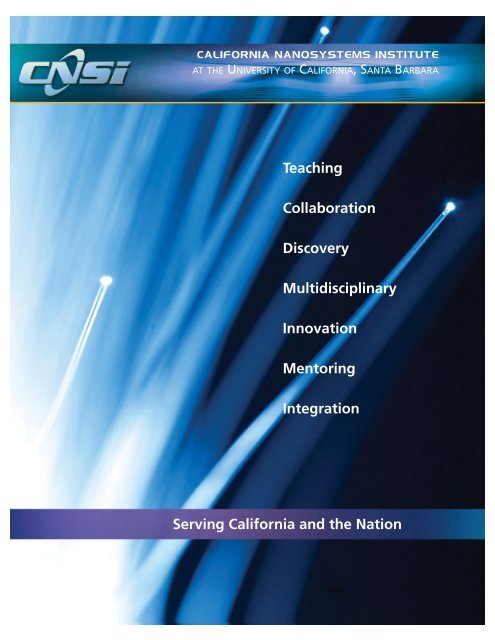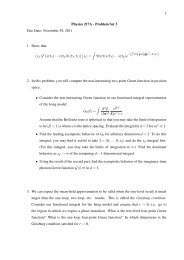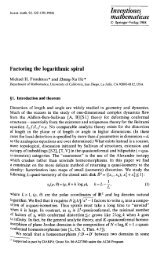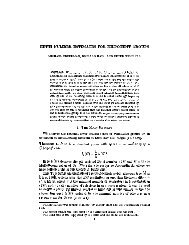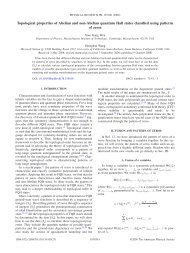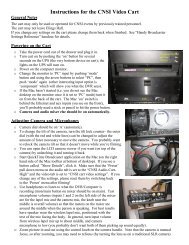Download Brochure - California NanoSystems Institute - University ...
Download Brochure - California NanoSystems Institute - University ...
Download Brochure - California NanoSystems Institute - University ...
Create successful ePaper yourself
Turn your PDF publications into a flip-book with our unique Google optimized e-Paper software.
CALIFORNIA NANOSYSTEMS INSTITUTE<br />
at the <strong>University</strong> of <strong>California</strong>, Santa Barbara<br />
Teaching<br />
Collaboration<br />
Discovery<br />
Multidisciplinary<br />
Innovation<br />
Mentoring<br />
Integration<br />
Serving <strong>California</strong> and the Nation
Facilitating a multidisciplinary approach to develop the information, biomedical and<br />
manufacturing technologies that will dominate science and economy in the 21st century.<br />
History<br />
The <strong>California</strong> <strong>NanoSystems</strong> <strong>Institute</strong> is a multidisciplinary<br />
research partnership between UCLA and UC Santa<br />
Barbara established by the state legislature and<br />
<strong>California</strong> industry in 2000 as one of the first <strong>California</strong><br />
<strong>Institute</strong>s for Science and Innovation. By exploring<br />
the power and potential of manipulating structures<br />
molecule-by-molecule, the CNSI is on its way to creating<br />
revolutionary new materials, devices, and systems that<br />
will enhance virtually every aspect of our lives – helping<br />
to drive <strong>California</strong>’s economy through innovations<br />
in medical delivery and health care, powerful new<br />
information technologies, energy efficient devices,<br />
environmental improvements, and more.<br />
Goals<br />
To provide a world-class intellectual and physical<br />
environment<br />
To generate the ideas, discoveries and the talent that<br />
will continue to fuel innovation in Nanosystems<br />
To foster interdisciplinary collaboration<br />
To support and mentor the next generation of<br />
scientists and engineers<br />
To provide crucial instrumentation and facilities<br />
necessary to propel the next generation of<br />
nanosystems discoveries<br />
Main Research Themes<br />
Biology & Biomedical<br />
New tools and diagnostics that can directly probe the<br />
electrical, structural and optical behavior of biological<br />
materials can not only illuminate our understanding<br />
of those systems but also inspire us with new device<br />
constructs that can be engineered from hybrid biologicalnon<br />
biological components.<br />
Energy Efficiency<br />
Nanoscale science enables the development of new<br />
materials and devices to improve energy efficiency,<br />
production, and storage.<br />
Information Technologies<br />
Nanophotonic and Nanoelectronic technologies promise<br />
to provide more compact and rapid information<br />
processing, as well as dramatically new means of<br />
accessing and controlling photons and charge.<br />
Research Partners<br />
Center for Polymers & Organic Solids<br />
www.cpos.ucsb.edu<br />
Center for Spintronics and Quantum Computation<br />
www.csqc.ucsb.edu<br />
Center for Stem Cell Biology and Engineering<br />
www.stemcell.ucsb.edu<br />
<strong>Institute</strong> for Collaborative Biotechnologies<br />
www.icb.ucsb.edu<br />
STAGE - Scientists, Technologists and Artists Generating<br />
Exploration<br />
www.stage.ucsb.edu<br />
Station Q<br />
http://stationq.ucsb.edu<br />
Western <strong>Institute</strong> of Nanoelectronics /<br />
www.win-nano.org
Education and Professional Development<br />
The CNSI Education Programs seek to increase science<br />
literacy by engaging the broadest range of learners in<br />
science and engineering education opportunities. We<br />
collaborate with educational partners at UCSB and in the<br />
community, bringing together students, educators, and<br />
researchers to develop activities which motivate, recruit<br />
and retain students in science and engineering fields.<br />
These programs also create new social networks and<br />
include mentorship as a particularly powerful resource<br />
to engage more students from disadvantaged and/or<br />
under-represented backgrounds.<br />
Education Program Goals<br />
Recruit a wide range of students as research interns<br />
in science and engineering<br />
Create academic and social support networks<br />
for undergraduate and graduate science and<br />
engineering students<br />
Establish partnerships with science teachers to<br />
promote innovative k-12 programs<br />
Develop hands-on science activities and resources<br />
that raise the profile of science and engineering in<br />
the local area<br />
Engage graduate and postdoctoral researchers in<br />
supervision and instruction that enables them to be<br />
effective mentors to younger recruits to science and<br />
engineering<br />
www.cnsi.ucsb.edu/education
Elings Hall<br />
Virgil Elings and Betty Elings Wells have made a $12.5<br />
million gift to UC Santa Barbara to support pioneering<br />
research at the <strong>California</strong> <strong>NanoSystems</strong> <strong>Institute</strong> (CNSI).<br />
In recognition of their recent gift, the new building that<br />
is home to the prestigious <strong>California</strong> <strong>Institute</strong> for Science<br />
and Innovation will be named in honor of Virgil Elings.<br />
The CNSI building, now known as Elings Hall, stands<br />
near the eastern entrance to the campus and is the hub<br />
for nanoscience research at UCSB. The institute fosters<br />
collaborative research and builds on the substantial<br />
and collective strengths of the College of Engineering<br />
and the sciences. It also brings together innovators<br />
from <strong>California</strong> universities, industries, and national<br />
laboratories and trains the next generation of innovators<br />
and entrepreneurs.<br />
Facilities<br />
Elings Hall houses cutting edge instrumentation and<br />
facilities that enable complete in-house fabrication<br />
of novel nanomaterials. A trio of shared laboratories<br />
are available to researchers interested in exploring<br />
the synergistic opportunities envisioned between<br />
the physical, chemical and biological attributes of<br />
nanostructures:<br />
The Chemical Nanostructures Laboratory<br />
The Biological NanoStructures Laboratory<br />
The Nanostructures Cleanroom Facility<br />
In addition, Elings Hall is home to the Allosphere, a<br />
one-of-a-kind research environment for the exploration<br />
of scientific phenomenon through integrated total<br />
immersion of the researcher.<br />
www.cnsi.ucsb.edu/facilities<br />
Contact Information<br />
www.cnsi.ucsb.edu<br />
<strong>California</strong> <strong>NanoSystems</strong> <strong>Institute</strong><br />
Elings Hall<br />
<strong>University</strong> of <strong>California</strong><br />
Santa Barbara, CA 93106-6105<br />
Phone: (805) 893-7510, Fax: (805) 893-6132<br />
Email: info@cnsi.ucsb.edu


